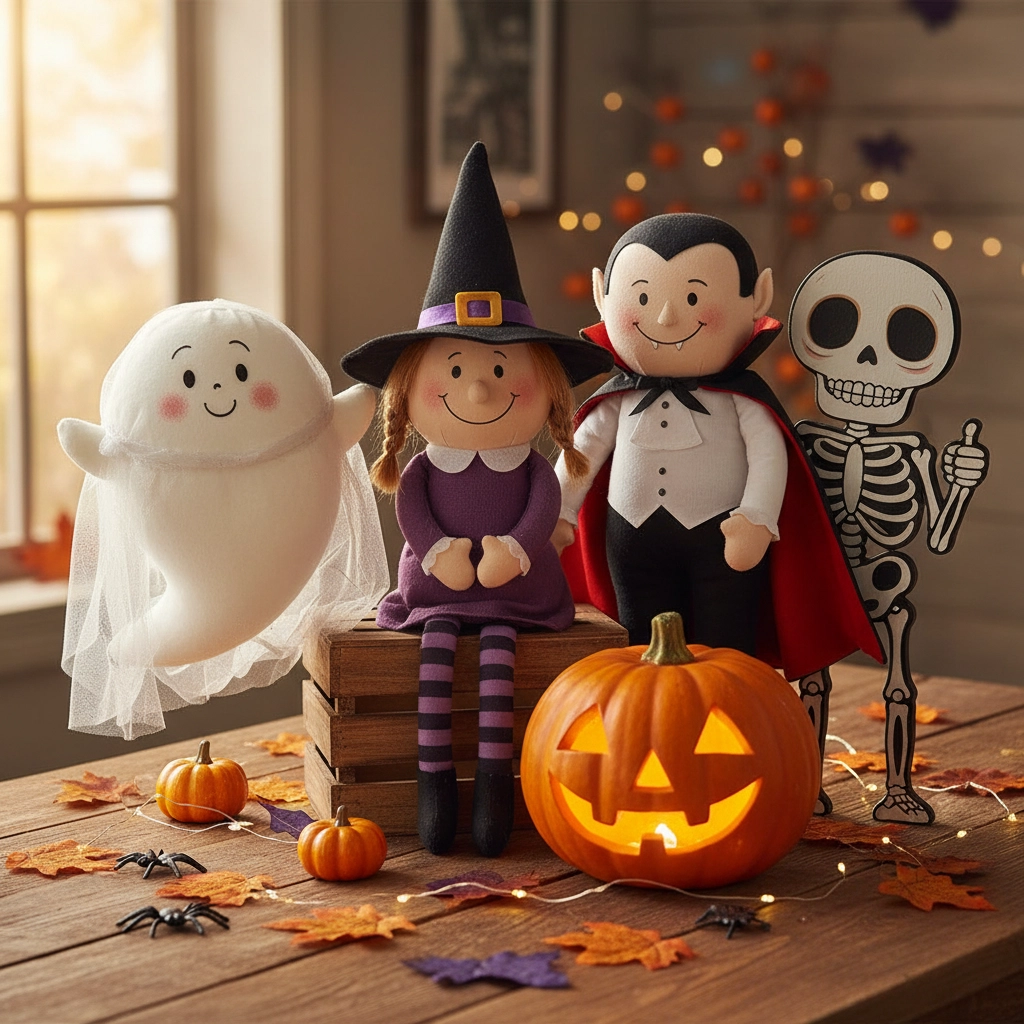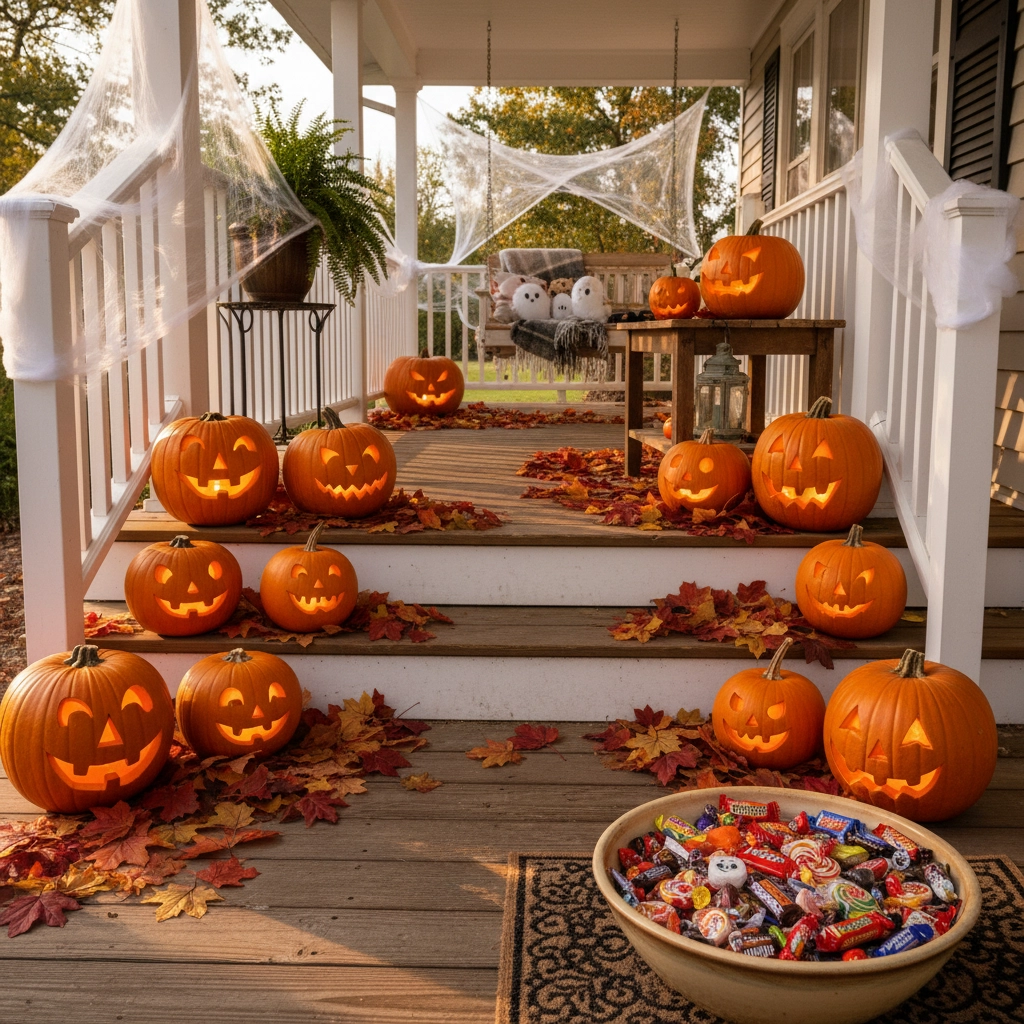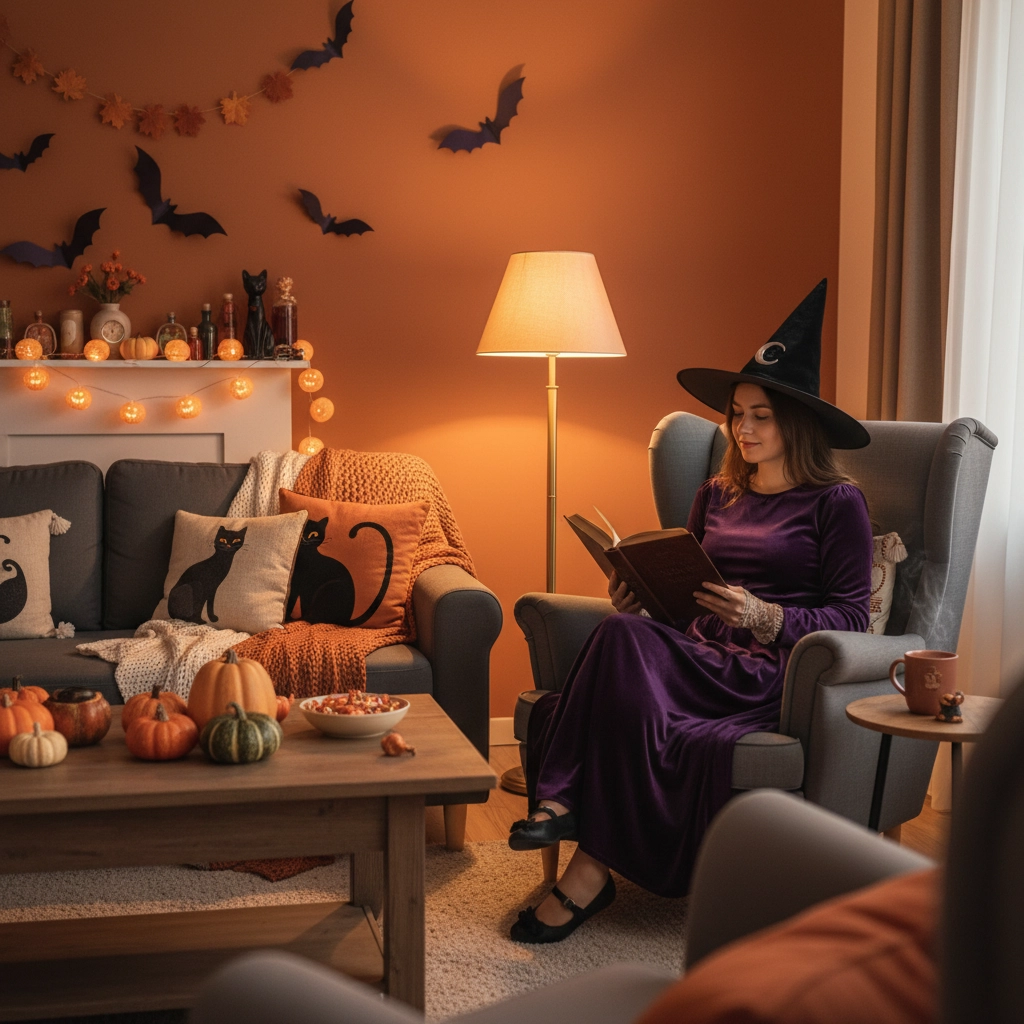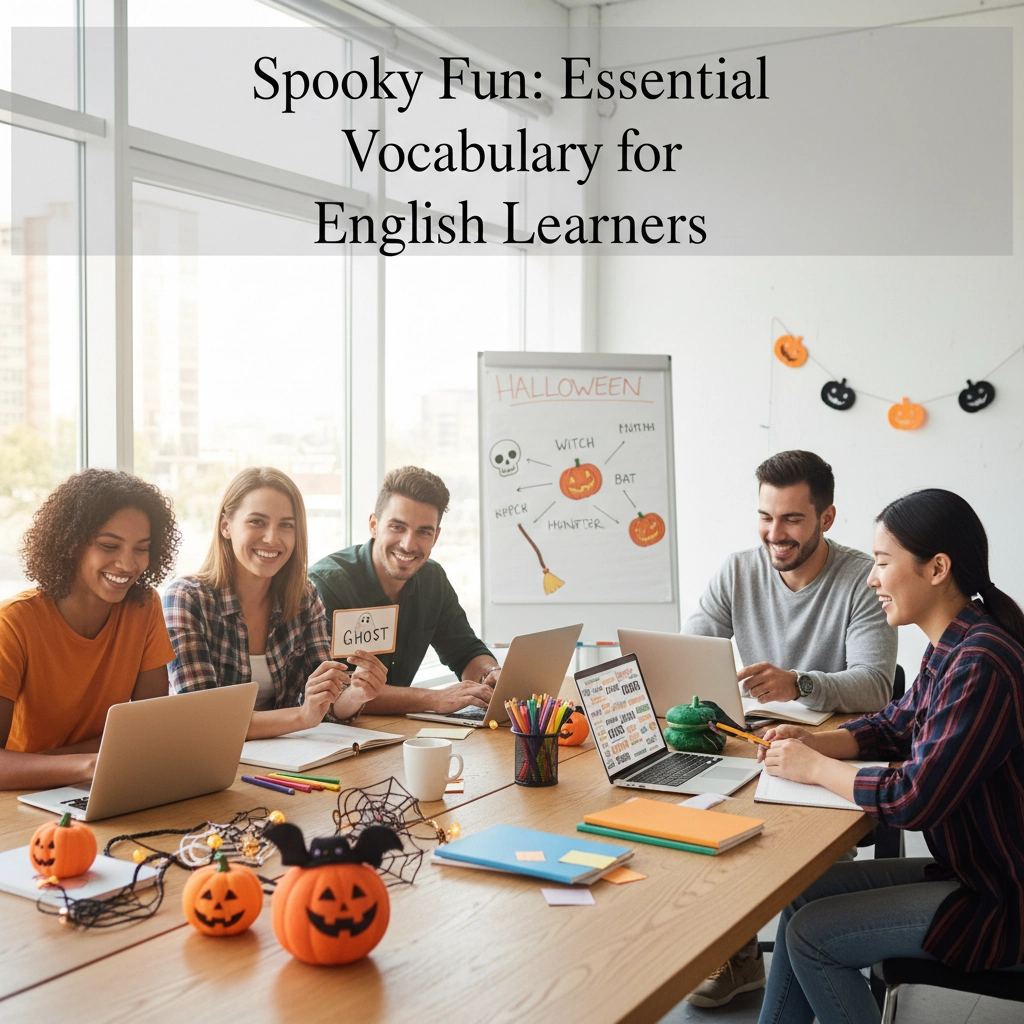Contents
ToggleHalloween is here, and what better time to expand your English vocabulary with some wonderfully spooky words? Whether you're planning to join Halloween celebrations or simply want to understand English-speaking culture better, learning Halloween vocabulary is both fun and practical. In my experience teaching English, students love learning these festive words because they're engaging, memorable, and give you a chance to practice English in a relaxed, playful way.
Let's dive into the essential Halloween vocabulary that will help you feel confident talking about this exciting holiday!
Halloween Characters and Creatures
The heart of Halloween lies in its cast of spooky characters. These are the figures you'll see in decorations, costumes, and movies throughout October.
Ghost – The spirit of a dead person that appears to the living. Ghosts are usually white, transparent, and float around saying "Boo!" You might hear someone say, "That old house looks haunted by ghosts."
Witch – A woman with magical powers who can cast spells and make potions. Traditional witches wear black pointed hats, ride broomsticks, and have black cats as companions. "The witch stirred her cauldron with a wooden spoon."
Vampire – A creature that drinks blood and typically avoids sunlight. Vampires often have fangs (sharp teeth) and sleep in coffins. "Count Dracula is the most famous vampire in literature."
Zombie – A dead body that has come back to life and walks around. Zombies move slowly and are often depicted as wanting to eat brains. "The zombie movies always make me jump!"
Werewolf – A person who transforms into a wolf-like creature during a full moon. "In the story, the werewolf only appears when the moon is full."

Other popular Halloween creatures include skeletons (the bones of a person), mummies (bodies wrapped in bandages), monsters (scary, imaginary creatures), and goblins (small, mischievous beings).
Costumes and Dressing Up
Halloween is famous for costume parties and trick-or-treating in disguise. Here's the vocabulary you need to talk about Halloween fashion.
Costume – Special clothing worn to look like someone or something else. "I'm making my own superhero costume this year."
Dress up – To put on a costume or special clothes. "What are you going to dress up as for Halloween?"
Mask – Something you wear over your face to hide your identity or look like someone else. "His scary clown mask frightened all the children."
Makeup – Special paints and colors applied to your face to create a look. "She used white makeup and dark circles to look like a ghost."
Cape – A sleeveless coat that hangs from your shoulders, often worn by vampires or superheroes. "His black cape flowed behind him as he walked."
When talking about costumes, you can say "I'm going as…" followed by what you're dressed as. For example: "I'm going as a pirate this Halloween!"
Halloween Activities and Traditions
Halloween brings specific activities that English speakers love to participate in. Understanding these terms will help you join the conversation about Halloween plans.
Trick-or-treat – The activity where children go from house to house asking for candy by saying "Trick or treat!" This phrase means "Give me a treat, or I'll play a trick on you!"
Carve – To cut shapes or faces into pumpkins. "We're going to carve jack-o'-lanterns tonight."
Jack-o'-lantern – A pumpkin with a face carved into it and a candle placed inside. "Our jack-o'-lantern has a scary grinning face."
Haunted house – A house that's supposedly full of ghosts, or an attraction designed to scare people. "The haunted house at the fair was terrifying!"
Decorate – To add Halloween items like fake spider webs, plastic skeletons, or orange and black banners to make a place look spooky. "We decorated our front yard with tombstones and ghosts."

Spooky Places and Settings
Halloween vocabulary includes many words that describe scary or mysterious places where spooky stories take place.
Graveyard/Cemetery – A place where dead people are buried. "The ghost story took place in an old graveyard."
Haunted – Describes a place where ghosts are believed to live. "They say the old mansion is haunted."
Dungeon – A dark underground prison or room, often found in castles. "The vampire's dungeon was filled with cobwebs."
Attic – The space just under the roof of a house, often portrayed as dusty and mysterious. "Strange noises came from the attic at night."
Cobweb/Spider web – The sticky net that spiders make, often used as Halloween decoration. "Fake cobwebs covered the corners of the haunted house."
Halloween Foods and Treats
Food plays a big part in Halloween celebrations, and there's specific vocabulary for Halloween goodies.
Candy – Sweet treats like chocolates, gummies, and lollipops that children collect while trick-or-treating. "My bag is full of candy!"
Pumpkin – The large orange vegetable that's carved into jack-o'-lanterns and used in pies. "Pumpkin spice flavoring is everywhere during Halloween season."
Caramel apple – An apple covered in sweet, sticky caramel. "Caramel apples are a traditional Halloween treat."
Potion – A magical drink, often made by witches. While not real food, toy potions are popular Halloween decorations. "The witch's green potion bubbled in her cauldron."
Describing Halloween Feelings and Atmosphere
Halloween is all about creating specific moods and feelings. These descriptive words will help you express the Halloween atmosphere.
Spooky – Mildly frightening in a fun way. "The decorations gave the house a spooky appearance."
Creepy – Causing an uncomfortable feeling of fear. "That doll looks really creepy."
Eerie – Strange and mysterious in a way that makes you feel nervous. "The fog created an eerie atmosphere in the graveyard."
Terrifying – Extremely frightening. "The haunted house was absolutely terrifying!"
Chilling – Causing a cold feeling of fear. "She told us a chilling ghost story."
Mysterious – Difficult to understand or explain. "There's something mysterious about that old house."

Useful Halloween Phrases and Expressions
Beyond individual words, here are complete phrases that will help you sound natural when discussing Halloween:
- "What are you dressing up as?" – Ask someone about their costume
- "Trick or treat!" – What children say when asking for candy
- "That gave me the chills" – Something scared you
- "I don't believe in ghosts" – You think ghosts aren't real
- "This place gives me the creeps" – A place makes you feel uncomfortable
- "You scared me to death!" – Someone frightened you very much
- "It was a real scream" – It was very funny or entertaining
Halloween Around the World
It's worth noting that while Halloween originated in Ireland and is most popular in North America, many English-speaking countries and international communities now celebrate it. This makes Halloween vocabulary particularly useful for English learners, as you're likely to encounter these words in movies, books, conversations, and social media.
In my experience, students find Halloween vocabulary especially memorable because the words are often dramatic and fun to say. Words like "werewolf," "jack-o'-lantern," and "trick-or-treat" stick in your memory much better than everyday vocabulary!
Putting It All Together
Now that you know the essential Halloween vocabulary, try using these words in context. You might say: "I'm dressing up as a witch for the Halloween party. I have a black costume, a pointed hat, and a broomstick. We're going to visit a haunted house and then go trick-or-treating. I hope we get lots of candy!"
Practice using these words when you talk about Halloween movies, decorations you see, or plans you have. The more you use them, the more natural they'll become.
Remember, Halloween vocabulary appears in many English books, movies, and conversations throughout October and beyond. Horror movies use this vocabulary year-round, and you'll find these words in classic literature and modern entertainment.
Ready to Practice Your Halloween English?
Learning Halloween vocabulary is just the beginning of your English journey. These words open doors to understanding English culture, enjoying English entertainment, and participating in conversations with native speakers.
If you're excited about expanding your English vocabulary beyond Halloween words, I'd love to help you continue learning. Join our free Wonderful World English community where you can practice these new words with other learners, get additional vocabulary lessons, and build your confidence in English conversation.
Join our community today and discover how fun and engaging English learning can be. Whether you're interested in holiday vocabulary, everyday conversation, or building fluency, we've got resources and support waiting for you.
Happy Halloween, and happy learning!





